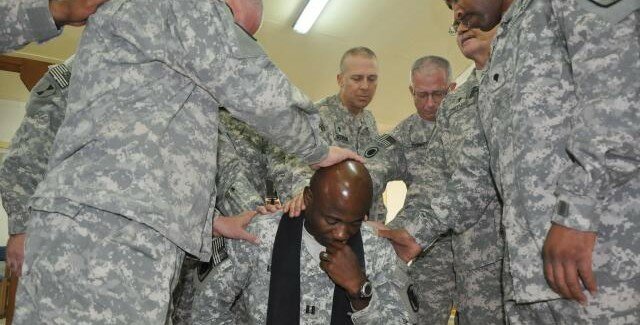Chaplains: Force Multiplier or Force Distracter?
Guest blog by Vicki Hudson
“I will seek to provide pastoral care and ministry to persons of religious bodies other than my own within my area of responsibility with the same investment of myself as I give to members of my own religious body. I will work collegially with chaplains of religious bodies other than my own as together we seek to provide as full a ministry as possible to our people. I will respect the beliefs and traditions of my colleagues and those to whom I minister. When conducting services of worship that include persons of other than my religious body I will draw upon those beliefs, principles, and practices that we have in common.”
- Code of Ethics for Chaplains of the United States Military
Religion in the military, including its practice, is a sensitive subject. One of the first leadership pitfalls I was taught as an Army Second Lieutenant was to never prevent a Soldier from practicing and attending worship services; if you do, that’s a sure way to get in serious trouble. One of the first leadership challenges was ensuring Soldiers could exercise their faith without it hindering training or mission requirements.
Every basic trainee figures out by the end of the first week that going to religious services is absolutely imperative. Going gets you out some of the weekend crap duties and guarantees a couple of hours of rest and relaxation, even if it’s sitting in a pew. When preparing for command, I was told “Always have the unit and national colors behind your desk, and the bible on your desk. It comforts Soldiers and hinders a butt-chewing from your boss.”
Some units make a show of weaving prayer and spiritual leadership into every action. Some units keep religious practices private and individual. Overwhelmingly, over my 33 years of service, overt religious practice was often oppressive to those not in the unit’s dominant faith group. As a junior enlisted Soldier, I was part of a company that made prayer ever-present at training events and functions. Going to war later with the same unit, now as a junior officer, prayer remained integral to every mission’s start and completion. Those that didn’t take part were often looked upon with disdain and distrust.
The message was clear: Good Soldiers pray together.
I didn’t necessarily agree with the dominant faith group, but I stood quietly and bowed my head just the same. It was required for survival and acceptance – something vitally important in any unit, but especially when going to war.
I vowed that when in command, no one would feel “required” to participate in group prayer, nor that only the dominant faith was important.
My own faith traveled a long and diverse journey. For a number of years I was a fundamental, evangelical Christian. For much of my thirties, I followed a spiritual path with no set denomination or faith. In my forties I converted to Judaism. My fundamental and enduring bedrock of faith, however, was forged in 1991, during wartime in the desert. That’s where I came to fully understand that God treasures each life created, that we are more alike than different as human beings, and that the path to the divine is varied yet ends in the same place – a relationship with that divine being who has many names, whom I simply call God. This belief required that I respect all others, that I tolerate benignly those who can’t believe or accept I have an enduring faith different from theirs, and that, as a leader, I ensure that every faith in my formation is respected.
Only recently did I become aware of a Chaplain’s Code of Ethics, and that it specifically speaks to an issue that has been a huge challenge with Chaplains and Chaplain Candidates I’ve worked or had contact with. Specifically, “When conducting services of worship that include persons of other than my religious body I will draw upon those beliefs, principles, and practice that we have in common.”
I wish I’d known about this phrase. As a past company and battalion commander, I’ve been faced with young officers challenged by how to abide by their denominational practices, and the requirement to meet unit spiritual needs with interfaith, pluralistic actions. Bottom line, prayer must not include phrases that while significant in the faith of the speaker, offend some of the listeners.
I’ve listened to and taken part in prayers led by a unit Chaplain at a unit event only to have a phrase end the prayer that clearly does not include me, as it is representative of a specific faith group yet offensive or counter to my faith’s beliefs. I have had several conversations with mid-grade and senior officer Chaplains when this occurs – trying to share my personal experience – because it’s a visceral, physical response deep in my body. I was in tune and part of a group and then experienced a psychic, violent ejection from that group.
If only I had known to draw the Chaplain to his own branch code of ethics to counter the inevitable response, one that was usually along the lines of, “Well, Chaplains have to stay true to their faith group.”
Really, Chaplain? Staying true to your faith group even when that means acting in a manner that violates the code of ethics of the military chaplain? To me, that just means a Chaplain who is failing the Chaplain mission. More importantly, it’s someone detracting from my ability to do my mission and help the Soldiers under my command or leadership have everything, including spiritual well-being and support, they need to perform and accomplish their mission.
A chaplain is a force multiplier. The Chaplain endures with the Soldier. The Chaplain shares the rough living, the rotten food, the cold, the damp, and the heat. The Chaplain provides a voice of comfort and hope in difficult and desperate conditions. For a few moments, or a few hours, the Chaplain provides an opportunity for respite. The Chaplain is a warm heart who unwearyingly listens and provides guidance and counsel for the conflicted and sorrowful.
The Chaplain must be greater than his or her personal beliefs; for if not, all those that believe different are unable to trust the Chaplain, and their spiritual needs within the unit will go without an avenue for relief. A Chaplain who is unable to attend to the diverse and pluralistic nature of any given military unit is not a force multiplier, but a force distracter.
The force distracter Chaplain isn’t a resource for the Commander, but a problem for the Commander. Where the force multiplier Chaplain is someone the Commander can refer a Soldier to with assurance and confidence that the individual will be respected and assisted; the force distracter Chaplain is one where a unit Commander may have to filter who is sent to the Chaplain, or risk subjecting an individual in need to the evangelical objectives of the Chaplain and his faith group rather than the support and pastoral care of the ministry.
A force multiplier Chaplain knows how to leverage the power of prayer and its integral pillars of hope and faith in a manner that includes all, even those that may not have any divine belief; the force distracter Chaplain will pray a unit prayer using phrases that reject members of the unit, indicating only some receive divine protection and hope. Leaving Soldiers spiritually behind before the battle even begins reduces their intrinsic chances for returning because sometimes what is in the heart, mind, and memory makes all the difference in the world.
The open inclusion of LGB service-members in the military has given rise to arguments centered on religious freedom for Chaplains from faith groups that do not accept the biological argument for sexual orientation that differs from the majority. They’re entitled to believe as they see fit; however, if these Chaplains are to adhere to the Chaplains Code of Ethics, they must be able to minister to all members of the military, not just the majority, be that majority faith or majority orientation. This is a volunteer military. If a Chaplain is unable to adhere to the mission of the military ministry, and to provide for the ministry of ALL members of the military, then the military ministry is not the vocation best suited for that Chaplain.
Soldiers (to include Sailors, Marines, Airmen, and Coast Guardsmen) need to know the Chaplain is guided by the highest of callings, and that is to provide for a service member’s spiritual needs, not a denomination’s evangelical objectives. Commanders need force multipliers, not force distracters. If a Chaplain is one of integrity, a true force multiplier, then “…when conducting services of worship that include persons of other than my religious body I will draw upon those beliefs, principles, and practices that we have in common…” is a no brainer, not difficult, and will not create an internal, ethical conflict.







